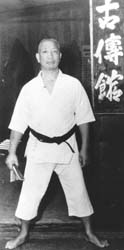Danzan Ryu Jujitsu began with Seishiro Okazaki in the early 1900s. His contribution to the martial art world was the revival of a lost concept that recognized the importance of combining healing (Kappo) and fighting (Sappo) arts to achieve the warrior spirit.
While these same arts had been practiced for generations throughout Asia, Okazaki organized them into a coherent and effective style described as Danzan Ryu Jujitsu. His system was called Kodenkan or School of the Ancient Tradition. Kappo techniques included restoration massage, seifukujutsu, moxibustion and resuscitation techniques. The Sappo techniques described lists of defensive arts or Yawara-Shin Gen. Today, these arts are practiced world wide by a dozen organizations.
Esoteric Principles
Professor Okazaki assembled written material that he called “Esoteric Principles”. This document draws principally on Taoist, Buddhist and Shinto thought. It is passed to students as the philosophical underpinnings of Kodenkan Danzan Ryu.
Since the fundamental principle acquired through the practice of Jujitsu has been elevated to a fine moral concept called judo, ‘the way of gentleness’ it may be said that the primary objective of practicing Judo is the perfection of character. And to perfect one’s character, one must be grateful for the abundant blessings of Heaven, Earth and Nature, as well as for the great love of parents; one must realize his enormous debt to teachers and be ever mindful of obligations to the general public.
As a member of a family, one’s first duty is to be filial to parents, to be helpful and harmonious with one’s wife or husband, and to be affectionate to brothers and sisters, so that the family may be sound successful and harmonious unit of the community.
As a member of a nation one must be grateful for the protection which one derives as a citizen; one must guard against self interest and foster a spirit of social service. One must be discreet in action, yet hold courage in high regard, and strive to cultivate manliness. One must be gentle, modest, polite and resourceful; never eccentric, but striving always to practice moderation in all things. One must realize that these qualities constitute the secret of the practice of Judo.
Anyone who practices Judo should have no fear facing stronger opponents, nor should he scorn weaker ones. With the skill which he develops, he does not oppose the strength of his opponent. For example, if a boat is floating on water then a single man’s strength is sufficient to maneuver it freely because the boat floats on top of the water. If the boat is on dry land then several men cannot move it. When a weak man faces a strong one, he should understand this principle.
Having developed skill in the form of techniques which constitute the basic art of Judo, one should never use these arts against anyone without sufficient justification. Therefore, refrain from arrogance and do not despise a small or weak opponent.
Every student of Judo should realize that sincerity is the foundation of all virtues, that kindness is the secret in one’s work, and that amiability is essential to success. Working pleasantly is the mother of health. Strenuous effort and diligence will overcome adverse circumstances. Simplicity, fortitude, and vigor are the keys to happiness; and service to humanity is the foundation of mutual existence and common prosperity.
An aptly expressed in the poem ‘the boughs that hang lowest’, one should never forget the virtue of modesty as one attains proficiency in the art of Judo. Do not disdain or regard lightly either literary or military art; each is important and deserves equal cultivation and respect. Within constant motion and change, there is tranquility; and within tranquility, there is motion and change. There is stillness in the midst of movement, movement in the midst of stillness.
One must not forget parental love and one’s enormous indebtedness to teachers nor fail to value those who come after us. Be grateful for the protection of Heaven and Earth. Be a good leader to younger students, to lead younger students well will in the long run mean to attain proficiency in the skill of Judo.
Like a drawing in India ink of the whispering of wind in the pines, the secrets of Judo can only be suggested. Only through personal experiences can one comprehend the mystic ecstasy of such secrets. It is said of Jujitsu that it would require ten years of practice to win victory over one’s self and twenty years to win victory over others.
Whatever the trails or dangers, even ‘ Hell under the upraised sword’ remain calm and remember the doctrine imparted to you by your teacher.
A noted verse reads “for the lotus flower to fall is to rise to the surface’.
Only by cultivating a receptive state of mind, without preconceived ideas or thoughts, can one master the secret art of reacting spontaneously and naturally without hesitation and without purposeless resistance. Emptying the self, one enters into the realm of dispassion and openheartedness, and for the first time is able to comprehend the secret art of benefiting both oneself and others in perfect harmony.
These then are the keys to the esoteric secrets of Kodenkan into which I have had the honor to initiate you.”
H. Seishiro Okazaki
Judo Master
Director of Kodenkan
